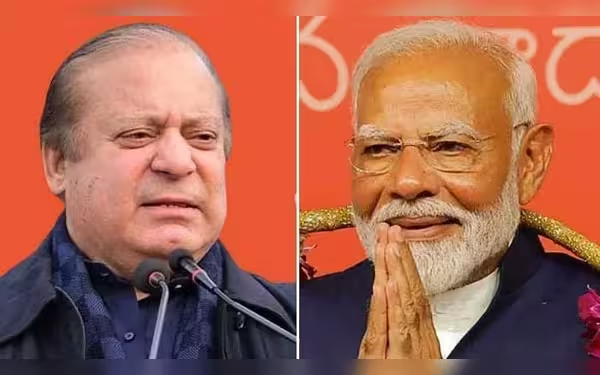Saturday, November 16, 2024 09:20 PM
Nawaz Sharif Expresses Hope for Meeting Modi
- Nawaz Sharif hopes to meet Modi soon.
- SCO summit in Islamabad may facilitate dialogue.
- Both leaders advocate for improved Indo-Pak relations.
 Image Credits: geo
Image Credits: geoNawaz Sharif expresses hope for a meeting with Modi, emphasizing the need for improved Indo-Pak relations ahead of the SCO summit.
In a significant development regarding Indo-Pak relations, former Prime Minister Nawaz Sharif has expressed his hopes of meeting Indian Prime Minister Narendra Modi in the "not-so-distant future." This statement comes as both nations prepare for the upcoming Shanghai Cooperation Organisation (SCO) summit in Islamabad, which is expected to be attended by Indian Foreign Minister Subrahmanyam Jaishankar. Nawaz Sharif, who is also the president of the Pakistan Muslim League-Nawaz (PML-N), has long been an advocate for fostering better ties with India.
During an interview with Indian journalist Barkha Dutt, Nawaz Sharif emphasized the importance of good relations between the two countries. He stated, "I have always been a supporter of good relations with India," highlighting his belief that there is a chance to revive the historically complex relationship. He further remarked, "It would have been a great thing if PM [Narendra] Modi had also attended the SCO summit. I do hope that he and us will have an opportunity to sit together in the not-so-distant future." This optimism is noteworthy, especially considering the strained ties that have characterized Indo-Pak relations in recent years.
Relations between India and Pakistan have fluctuated over the years, often swinging between periods of thaw and tension. The diplomatic ties were significantly downgraded in 2019 when Pakistan reacted to India's abrogation of Article 370, which revoked the special status of Indian Illegally Occupied Jammu and Kashmir (IIOJK). Since then, Islamabad has made it clear that any normalization of relations with New Delhi is contingent upon the restoration of this special status.
Despite these challenges, there have been some positive developments. In February 2021, both countries agreed to renew the 2003 ceasefire agreement along the Line of Control (LoC), a move that was welcomed by many as a step towards reducing tensions. Earlier this year, Nawaz Sharif reiterated the need to improve relations not only with India but also with Afghanistan, recalling that during his previous tenures, two Indian Prime Ministers—Atal Bihari Vajpayee in 1999 and Narendra Modi in 2015—visited Pakistan.
In a gesture of goodwill, Nawaz Sharif congratulated Modi on his re-election as Prime Minister for a record third term, stating, "Your party’s success in recent elections reflects the confidence of the people in your leadership." He urged both nations to "replace hate with hope" and to seize the opportunity to shape the future of the two billion people living in South Asia. Modi responded positively, appreciating Sharif's message and reaffirming India's commitment to peace and security.
The prospect of a meeting between Nawaz Sharif and Narendra Modi could signal a new chapter in Indo-Pak relations, one that prioritizes dialogue and cooperation over conflict. As both leaders express a willingness to engage, it remains to be seen whether this optimism can translate into tangible actions that benefit the people of both nations. The world is watching closely, and the hope is that this dialogue can pave the way for a more peaceful and prosperous South Asia.













